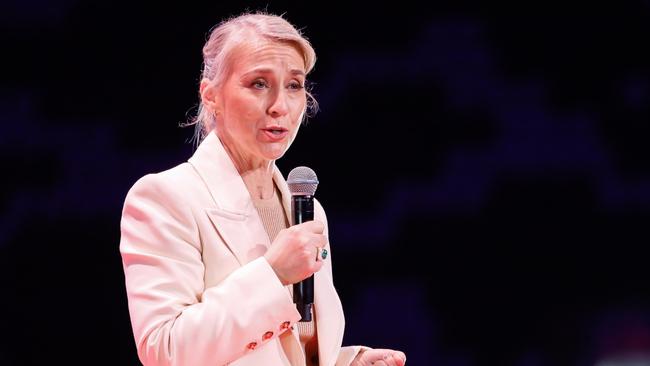Advertising and sponsorship are biggest challenges ahead for women’s sport
Women’s sport is soaring in popularity but it is facing some uphill battles to ensure its growth continues, Foxtel’s chief commercial and content officer Amanda Laing says.

The popularity of women’s sport continues to surge but reeling in advertising and sponsorship dollars remains a challenge, Foxtel’s chief commercial and content officer Amanda Laing says.
“We seen this for a while, the growth in women’s sport, viewership and in female athletes becoming well known and great ambassadors for their sport, sportsmanship and health and wellbeing,” she said.
“But the advertising and sponsorship dollars have not flowed to meet the rise in popularity.
“For us, it’s really trying to bring in the advertisers and sponsorship dollars … Foxtel Media has been working with our advertisers and sponsors for our key codes.”
Suncorp had been a leader in providing financial support for women’s netball, as had the Commonwealth Bank in women’s cricket, the Foxtel executive said.
Ms Laing will be among the key executives speaking at the SportNXT – Shaping the Future of Sport conference, which will be held in Melbourne on Tuesday and Wednesday.
Ms Laing will be among five panellists to discuss performance in women’s sport, and issues including sustainability, commercialisation and performance.
She will be alongside Cricket Australia chief executive Nick Hockley, the Australian Rugby League Commission’s Kate Jones, Football Australia’s head of women’s football, women’s World Cup legacy and inclusion Sarah Walsh, and Fox Sports presenter Mel Jones.
Foxtel has the broadcast rights to most premier female sports including cricket, AFLW, NRLW, netball and surfing, and Ms Laing said the media company’s “strategy and investment” was paying off for women’s codes.
“With greater exposure comes more fans, more sponsorship, more attendance, more revenue and therefore better pay, better conditions,” she said.
The Foxtel executive said putting women’s sport on screens was critical, as was having women on camera talking about sport. She highlighted the success of some of Foxtel’s female sporting commentators, including Isa Guha, Yvonne Sampson, Sarah Jones, Kath Loughnan and Jess Yates.
On Friday, it was revealed the Labor government has postponed any changes to the 30-year-old anti-siphoning laws, which favour commercial free-to-air TV networks over streaming platforms, with regards to sports broadcasting rights.
Ms Laing said: “If the desire is to ensure people have access to certain sporting events for free then the legislation should catch up with the behaviour and the technology, free should just mean free and it shouldn’t be limited to a particular delivery mechanism.”
But those laws have also drawn criticism from sporting bodies, including the AFL, NRL and Netball Australia, who argue that adhering to the old rules will limit investment in grassroots sports.
Foxtel Group chief executive Patrick Delany said: “It’s time for the playing field to be levelled – with new rules that reflect the landscape of today, the rights and habits of Aussie sporting fans, and unlock additional funding for sporting bodies to invest in growing sport.”




To join the conversation, please log in. Don't have an account? Register
Join the conversation, you are commenting as Logout